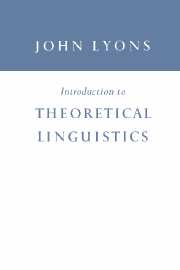Book contents
- Frontmatter
- Contents
- PREFACE TO THE 1995 EDITION
- 1 Linguistics: The Scientific Study of Language
- 2 The Structure of Language
- 3 The Sounds of Language
- 4 Grammar: General Principles
- 5 Grammatical Units
- 6 Grammatical Structure
- 7 Grammatical Categories
- 8 Grammatical Functions
- 9 Semantics: General Principles
- 10 Semantic Structure
- Notes and references
- Addenda
- Bibliography
- Table of symbols and notational conventions
- Index of proper names
- Index of subjects
1 - Linguistics: The Scientific Study of Language
Published online by Cambridge University Press: 05 June 2012
- Frontmatter
- Contents
- PREFACE TO THE 1995 EDITION
- 1 Linguistics: The Scientific Study of Language
- 2 The Structure of Language
- 3 The Sounds of Language
- 4 Grammar: General Principles
- 5 Grammatical Units
- 6 Grammatical Structure
- 7 Grammatical Categories
- 8 Grammatical Functions
- 9 Semantics: General Principles
- 10 Semantic Structure
- Notes and references
- Addenda
- Bibliography
- Table of symbols and notational conventions
- Index of proper names
- Index of subjects
Summary
Introductory
Definition of linguistics
Linguistics may be defined as the scientific study of language. This definition is hardly sufficient to give the reader any positive indication of the fundamental principles of the subject. It may be made a little more revealing by drawing in greater detail the implications contained in the qualification ‘scientific’. For the moment, it will be enough to say that by the scientific study of language is meant its investigation by means of controlled and empirically verifiable observations and with reference to some general theory of language-structure.
Linguistic terminology
It is sometimes suggested that the terminology, or ‘jargon’, of modern linguistics is unnecessarily complex. This is a criticism which need not detain us long. Every science has its own technical vocabulary: it is only because the layman takes on trust the established sciences, and especially the ‘natural’ sciences, that he does not question their right to furnish themselves with special vocabularies. The technical terms used by linguists arise in the course of their work and are easily understood by those who approach the subject sympathetically and without prejudice. It should not be forgotten that most of the terms which the non-linguist employs to talk about language (‘word’, ‘syllable’, ‘letter’, ‘phrase’, ‘sentence’, ‘noun’, ‘verb’, etc.) originated as technical terms of traditional grammar and are no less ‘abstract’ in their reference than the more recent creations of linguists.
Information
- Type
- Chapter
- Information
- Introduction to Theoretical Linguistics , pp. 1 - 52Publisher: Cambridge University PressPrint publication year: 1968
